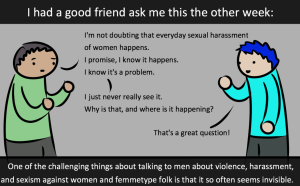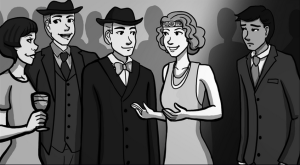
Source: Stock Clip
Just about one year ago, I lost my job.
It had been my first job out of college, and I had only been working there for three months when I was suddenly laid off.
Being laid off was one of those things I saw happening to a lot of other people, but never considered was a possibility for myself. Then my boss took me into the conference room and told me they were eliminating my position.
To make matters worse, I had recently moved halfway across the country to take the job. I had uprooted my entire life, convinced my partner to come with me, and signed a lease in a city where we knew nobody and had no support.
The six months it took me to find a new position changed me, and maybe more importantly, informed my feminism.
My brief stint in unemployment brought me face-to-face with oppression in a way I never had thought I’d see. It showed me even more than before that sexism is real – and unavoidable. It absolutely solidified that I will be treated differently in many professional environments because I am a woman.
It also brought me face-to-face with my own privilege.
I may not have realized it before, but my privilege was the only thing that had gotten me a job to begin with, and many people would not have had the opportunities to find a second job as quickly as I did.
I would not have been able to get through my unemployment without my privilege, and I certainly wouldn’t have had as much luck in my job search without it.
Most importantly, what I lived for only a few months is what others live with every day, for their whole lives.
Job stability is a privilege. Having a “career” instead of a “job” is a privilege. Benefits, health insurance, and a living wage are all privileges, too – and I no longer take them for granted.
I learned all of this and so much more while unemployed.
Losing my job meant confronting my privilege on a day-to-day basis, and now that I’ve come out of the other side, it also means continuing to think about how I benefit from that privilege even when it isn’t as obvious.
Here are just some of the other things I learned:
1. Benefits Are a Privilege
Due to a very complicated situation involving being a military dependent and having a job where benefits didn’t kick in for three months, I spent almost half a year after college completely uninsured.
As seems so often to be the case, I also faced a major health crisis at the same time.
Spending so much time thinking about how I could get the medical care I needed without insurance (spoiler: I wasn’t able to) was both physically and emotionally draining.
Eventually, I was able to be reinstated on my parents’ health insurance thanks to the Affordable Care Act, which allows young people to stay on these plans until they turn 26. This literally saved my life, and I am so unbelievably grateful for it.
But millions of people aren’t so lucky.
According to the Congressional Budget Office, more than 42 million people in the United States still lack health insurance.
While working part-time jobs and freelancing in order to make ends meet, I also no longer had access to the benefits I had taken for granted during my last job. Things many people think of as givens like paid sick leave, vacation time, and even having holidays off don’t come standard in all positions, especially in hourly and part-time work.
These benefits seemed so standard to me that I never even considered they were something I might not always have.
What this means is that when you’re sick, you have to choose between your health and your paycheck. It turns out that one of the privileges I never noticed I had was having benefits through my employer.
2. Sexism in the Workplace Is Real
Despite having been a feminist for years, it had never really occurred to me that I might encounter sexism in the workplace, let alone on the job hunt.
I had previously been unbelievably lucky when it came to my work environments. Having worked almost exclusively at women-centered nonprofit organizations, I didn’t actually see sexism in the professional world coming.
Then I started actively looking for jobs in the private sector.
Everything was going well enough, and soon enough I got a job offer for a really awesome position for a company I really wanted to work for. During the interview, I discussed with the company’s owner and manager the minimum that I would accept to do the position, which was in-line with what the position had advertised paying.
When I came in later to discuss my job offer with the company, I expected an offer close to what I had told them was my minimum rate, but what I got surprised me: They offered to pay me just $500 a month instead of the advertised salaried rate to do the same amount of work.
When I inquired about the difference, the company offered me a side-job as a waitress which they deemed “would be perfect for a young woman like you” who should “have no trouble making enough tips to make up the difference.”
I left the meeting in shock, and needless to say, I did not accept the position.
I cannot imagine that a man with similar experience would have been offered a rate so incredibly low, let alone have had it justified with the ridiculously sexist claim that I could make up the difference because “a young woman” like me would make a lot in tips.
This was my first encounter with sexism in the professional environment, but I cannot imagine it will be my last. However, the experience taught me not only to keep an eye out for similar situations, but also to place value in myself and what I bring to the table.
3. I Am Unbelievably Privileged
I have never been particularly well-off, but there is nothing like losing your job to give you a real look at what doing without is like.
Very suddenly, I started thinking about how I was going to pay rent without a paycheck. I started thinking about how I was going to get by in three months, six months, or one year if I didn’t find a job.
Quite frankly, when I finally did get my new job, I was getting dangerously close to not being able to make ends meet.
Despite how scary this was for me, the reality is that I didn’t have it so bad.
I’ve been speaking about privilege for a long time, but part of having privilege means you probably don’t think about every way that you benefit from it.
When I was laid off, I was still well-off enough to make it work. I was lucky enough to have already paid off my student loans, to have had some money in the bank, and to have family and friends to support me both emotionally and financially.
But so many others do not have access to the resources and support that I did.
I never went hungry. I never worried that I would lose my apartment because nobody would be able to help me pay my rent. I knew that eventually the job I so desperately needed would come, and in time, it did.
Except not everybody is as lucky as I am.
What I lived for six months is what many in the United State face every day for much of their lives.
Some also have it much worse.
Over 49 million people in the United States live in food insecure households, meaning that they do not have access (or have limited access) to food, and more than 600,000 Americans are homeless on any given day.
The nightmare I lived for a short time I was able to pull myself out of because of my privilege, and it taught me not to take these things for granted.
More importantly, it taught me that these things shouldn’t be a privilege, and that I need to use my voice to speak up for those who don’t have access to the same privileges and resources that helped me through the time.
4. The Importance of Addressing Your Privilege
After waking up to how much I benefited professionally from my own privilege as a white middle-class woman, I also realized the importance of consistently addressing it both in my own life and in the culture at large.
That means practicing what you preach when it comes to privilege. Confront how you experience it in your own life on a day-to-day basis. Think about how your identity impacts your lived experiences, and address it when applicable.
A great place to start is to take a look at Peggy McIntosh’s Unpacking the Invisible Knapsack, a checklist on white privilege or with similarchecklists on being cis, straight, or male.
From there, think about ways to make your feminism more intersectional. Consider the ways that class, gender, sexuality, and race intersect to give you privilege or privilege others, and address it through feminism.
Finally, take all that you have learned and let it inform your activism.
The best and easiest way to do this is to speak up about inequality and oppression. Talk about how you benefit from privilege, and how you are held back by different intersections of oppression. Discuss it with your friends and family, blog about it, organize a workshop about it with a student group, write letters to the editor – just find the best way to make your voice heard and use it.
[do_widget id=”text-101″]
Want to discuss this further? Visit our online forum and start a post!
Ally Boghun is a Contributing Writer at Everyday Feminism. She is a feminist activist and media researcher living and working in Washington, DC. Ally completed both her B.A. in Communications and Art History as well as her M.S. in Professional Communications at Clark University, where she researched abortion debate rhetoric. She is also the founder and editor of Because I am a Woman, a blog devoted to intersectional feminism and reproductive justice. In her spare time, you can find her at an art museum, consuming massive amounts of coffee while writing, or trying to convince her cat to go for walk. You can follow Ally on Twitter @AllyBoguhn. Read her articles here.
Search our 3000+ articles!
Read our articles about:
Our online racial justice training
Used by hundreds of universities, non-profits, and businesses.
Click to learn more




















